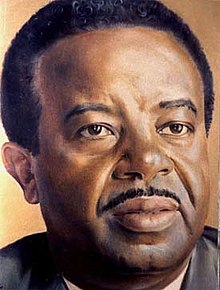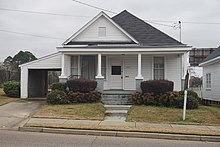Ralph Abernathy
Ralph David Abernathy Sr. (/ˈæbərnæθi/; March 11, 1926 – April 17, 1990) was an American civil rights activist and Baptist minister.
As a leader of the civil rights movement, he was a close friend and mentor of Martin Luther King Jr.
He became president of the SCLC following the assassination of King in 1968; he led the Poor People's Campaign in Washington, D.C.,[1] as well as other marches and demonstrations for disenfranchised Americans.
He later founded the Foundation for Economic Enterprises Development, and he testified before the U.S. Congress in support of extending the Voting Rights Act in 1982.
In 1989, Abernathy wrote And the Walls Came Tumbling Down, a controversial autobiography about his and King's involvement in the civil rights movement.
[8] During World War II, he enlisted in the United States Army advancing in rank becoming platoon sergeant before being discharged.
[10] As a sophomore, he was elected president of the student council, and led a successful hunger strike to raise the quality of the food served on the campus.
[10] While still a college student, Abernathy announced his call to the ministry, which he had envisioned since he was a small boy growing up in a devout Baptist family.
[4][6][18][19] Along with fellow English professor Jo Ann Robinson, they called for and distributed flyers asking the black citizens of Montgomery to stay off the buses.
[36][37] King, from inside the church, called the Attorney General Robert F. Kennedy, and pleaded for help from the federal government.
[6] The King/Abernathy partnership spearheaded successful nonviolent movements in Montgomery; Albany, Georgia; Birmingham, Mississippi, Washington D.C., Selma, Alabama; St. Augustine, Florida; Chicago, and Memphis.
King and Abernathy journeyed together, often sharing the same hotel rooms, and leisure times with their wives, children, family, and friends.
[44] Until King's assassination, Abernathy had served as Southern Christian Leadership Conference's first Financial Secretary/Treasurer and Vice President At-Large.
[48] He was met by Thomas O. Paine, the administrator of NASA, whom he told that in the face of such suffering, space flight represented an inhuman priority and funds should be spent instead to "feed the hungry, clothe the naked, tend the sick, and house the homeless".
[51] In 1973, Abernathy helped negotiate a peace settlement at the Wounded Knee uprising between the Federal Bureau of Investigation and the leaders of the American Indian Movement, Russell Means and Dennis Banks.
[58] He founded the nonprofit organization Foundation for Economic Enterprises Development (FEED), which offered managerial and technical training, creating jobs, income, business and trade opportunities for underemployed and unemployed workers for underprivileged blacks.
[59] However, he shocked critics a few weeks before the 1980 November election, when he endorsed the front-runner, Ronald Reagan, over the struggling presidential campaign of Jimmy Carter.
[62] In 1982, Abernathy testified—along with his executive associate, James Peterson of Berkeley, California—before the Congressional Hearings calling for the Extension of the Voting Rights Act.
[63] Documents declassified in 2017 show that Abernathy was on the National Security Agency watchlist because of FBI leadership's hatred of the civil rights movement.
[65][2] In the 1980s, the Unification Church hired Abernathy as a spokesperson to protest the news media's use of the term "Moonies", which they compared with the word "nigger".
[69] Abernathy died at Emory Crawford Long Memorial Hospital on the morning of April 17, 1990, from two blood clots that traveled to his heart and lungs, at the age of 64.
[25] After his death George H. W. Bush, then-President of the United States issued the following statement: Barbara and I join with all Americans to mourn the passing of the Rev.
Ralph Abernathy, a great leader in the struggle for civil rights for all Americans and a tireless campaigner for justice.


